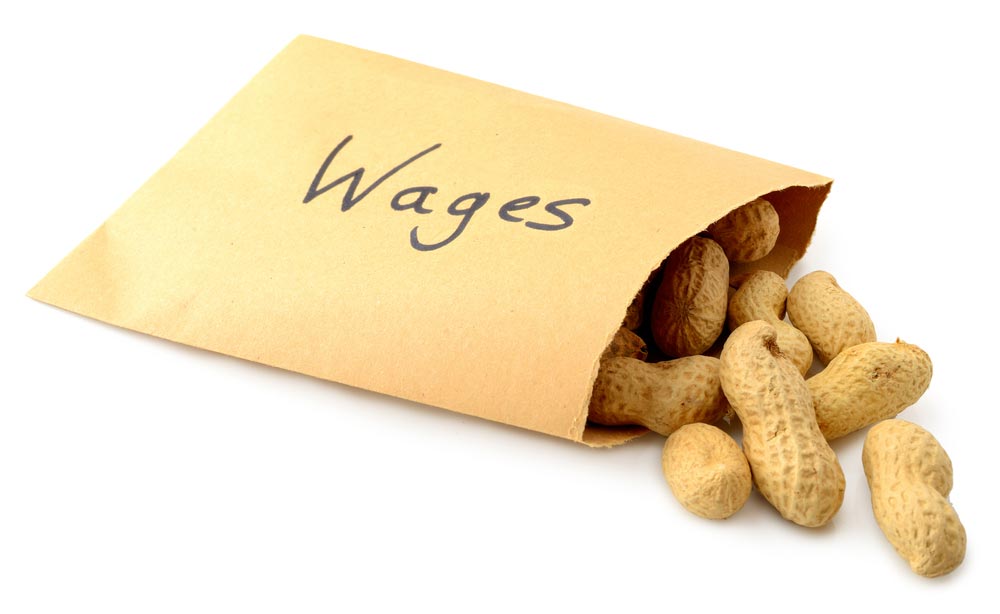
Rob Hyrons / Shutterstock.com
As a high schooler working your first job or a college student trying to make some extra cash, you might be looking at positions that pay minimum wage. While some states have implemented laws that raise their minimum wage above the federally mandated $7.25 per hour, you’re unlikely to net much more than $1,200 a month, and that’s working full time, before taxes. The money isn’t mind blowing, but these jobs are nice because there are a ton of them available, and you really don’t need any prior experience.
Whether you’re working the register at a fast food joint or folding clothes at the mall, you may see this job solely as a means to an end—like saving up for a car or a spring break vacation. While a minimum wage job is a great way to make some extra money, these gigs are often customer service jobs, which means dealing with customers. Unfortunately, because these positions are open to nearly anyone who applies and has a pulse, the jobs don’t always come with much respect. That’s not to say you’re not deserving of respect; you are. The “customer is always right” mentality, however, and the perceived inequality between the customer and the one providing the service, can lead to unfair treatment.
So, what can you gain from a position like this—besides a paycheck? Well…
Experience: If you’ve never held a job before, a minimum wage position is likely where you’ll start out. Whether you work after school during the year, full time for a summer or two, or weekend shifts while you’re in college, you’re creating employment history that can be added to your résumé.
Perspective: Suddenly, having been both a customer and an employee, you’ll understand things from both sides. This ability to put yourself in another’s shoes will benefit you for the rest of your life and makes you less likely to blame others for problems beyond their (and your) control.
Empathy: With a new perspective, you will also develop a greater sense of empathy. Being able to understand and anticipate the emotions, motivations, and reactions of those around you is invaluable as both an employee and a customer.
Humility: The addition of perspective and empathy will also lend itself to an added dose of humility. As a customer, you’ll likely be more patient with employees you encounter in the future having been in their shoes. As an employee, you’ll quite literally gain the ability to focus on serving the needs of others before yourself.
Budgeting skills: Regardless of your age, working and earning an income keeps your bills and money in perspective and teaches you the value of a dollar. No matter how small your paycheck, you’re in control of what you do with it. You’ll learn very quickly about your priorities and how much is too much to pay for certain items and experiences.
Hard skills: Manning the cash register, counting change, having basic social interactions with strangers, and learning cleaning routines are just a few skills you might pick up along the way. You never know when you’re going to need to use them later on in your life. (Or, maybe selling peanuts at the ballpark is just a way for you to see the games for free. That’s okay too.)
The ability to handle criticism: Feedback, whether given harshly in anger or by someone who truly means well, can be difficult to take. Learning how to accept legitimate criticism and use it to improve yourself is incredibly difficult, but immensely valuable. Knowing when to brush off statements that are excessively cruel or unwarranted is also important, and will help you develop a thick skin.
The ability to work with others: Group projects at school were really the tip of the iceberg in terms of the reality of working with others. Whereas at school the pairing was usually only for one project (and one grade), at work you may be constantly paired with someone who is lazy, inept, or simply drives you crazy. Figuring out how to handle that will earn you massive points.
Working a minimum wage job probably isn’t your long-term plan, but you will get something out of it. What lessons have you learned from some of the more menial jobs you’ve taken?
-
Social Networking Platforms for the Creative Student
-
How to Prepare for An Administrative Assistant Interview
-
Public Speaking: How to Use Your Voice to Climb to Success
-
Six Companies that Offer Tuition Assistance to Their Employees
-
How to Prepare for and Succeed at Your Next Interview
-
Summer Jobs in College: Why It’s Okay to Work a Different Job Each Year
-
Fresh Grads: Tips to Jump-Start Your Job Search
-
12 Things You Should Not Put on Your Résumé
-
Co-ops (Cooperative Educational Experiences) in College
-
Seven Last-Minute Ways to Improve Your College Résumé

